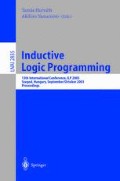Abstract
Given a sample from an unknown probability distribution over strings, there exist algorithms for inferring the structure and parameters of stochastic grammatical representations of the unknown distribution, i.e. string grammars. Despite the fact that research on grammatical representations of sets of graphs has been conducted since the late 1960’s, almost no work has considered the possibility of stochastic graph grammars and no algorithms exist for inferring stochastic graph grammars from data. This paper presents PEGG, an algorithm for estimating the parameters of stochastic context-free graph grammars given a sample from an unknown probability distribution over graphs. It is established formally that for a certain class of graph grammars PEGG finds parameter estimates in polynomial time that maximize the likelihood of the data, and preliminary empirical results demonstrate that the algorithm performs well in practice.
Access this chapter
Tax calculation will be finalised at checkout
Purchases are for personal use only
Preview
Unable to display preview. Download preview PDF.
References
Bartsch-Sprol, B.: Grammatical inference of graph grammars for syntactic pattern recognition. In: Ehrig, H., Nagl, M., Rozenberg, G. (eds.) Proceedings of the second international workshop on graph grammars and their applications to computer science, Springer, Heidelberg (1983)
Charniak, E.: Statistical language learning. MIT Press, Cambridge (1993)
Cook, D., Holder, L.B., Su, S., Maglothin, R., Jonyer, I.: Structural mining of molecular biology data. IEEE Engineering in Medicine and Biology 20, 231–255 (2001)
Courcelle, B.: An axiomatic definition of context-free rewriting and its application to NLC graph grammars. Theoretical Computer Science 55, 141–181 (1987)
Courcelle, B.: The expression of graph properties and graph transformations in monadic second-order logic. In: Rozenberg, G. (ed.) Handbook of graph grammars and computing by graph transformation: Foundations, World Scientific Publishing Company, Singapore (1997)
Dempster, A.P., Laird, N.M., Rubin, D.B.: Maximum likelihood from incomplete data via the EM algorithm. Journal of the Royal Statistical Society Series B 39, 1–38 (1977)
Doshi, S., Huang, F., Oates, T.: Inferring the structure of graph grammars from data. In: Proceedings of the International Conference on Knowledge-Based Computer Systems (2002)
Drewes, F., Kreowski, H.J., Habel, A.: Hyperedge replacement graph grammars. In: Rozenberg, G. (ed.) Handbook of graph grammars and computing by graph transformation: Foundations, World Scientific Publishing Company, Singapore (1997)
Ehrig, H., Engels, G., Kreowski, H.-J., Rozenberg, G. (eds.): Handbook of graph grammars and computing by graph transformation: Applications, languages and tools. World Scientific Publishing Company, Singapore (1999)
Engelfriet, J., Rozenberg, G.: Node replacement graph grammars. In: Rozenberg, G. (ed.) Handbook of graph grammars and computing by graph transformation: Foundations, World Scientific Publishing Company, Singapore (1997)
Fletcher, P.: Connectionist learning of regular graph grammars. Connection Science 13, 127–188 (2001)
Hong, P., Huang, T.S.: Spatial pattern discovery by learning a probabilistic parametric model from multiple attributed relational graphs. Journal of Discrete Applied Mathematics (2002)
Hopcroft, J.E., Ullman, J.D.: Introduction to automata theory, languages, and computation. Addison-Wesley Publishing Company, Reading (1979)
Immerman, N.: Descriptive complexity. Springer, Heidelberg (1999)
Jeltsch, E., Kreowski, H.J.: Grammatical inference based on hyperedge replacement. In: Ehrig, H., Kreowski, H.-J., Rozenberg, G. (eds.) Graph Grammars 1990. LNCS, vol. 532, pp. 461–474. Springer, Heidelberg (1991)
Jonyer, I., Holder, L.B., Cook, D.J.: Concept formation using graph grammars. In: Working Notes of the KDD Workshop on Multi-Relational Data Mining (2002)
Lari, K., Young, S.J.: The estimation of stochastic context-free grammars using the inside-outside algorithm. Computer Speech and Language 4, 35–56 (1990)
Lautemann, C.: The complexity of graph languages generated by hyperedge replacement. Acta Informatica 27, 399–421 (1990)
Mosbah, M.: Properties of random graphs generated by probabilistic graph grammars. In: Proceedings of the The Fifth International Workshop on Graph Grammars and their Application to Computer Science (1994)
Muggleton, S.: Stochastic logic programs. In: De Raedt, L. (ed.) Advances in inductive logic programming, pp. 254–264 (1996)
Office of Technology Assessment, U.C. Information technologies for control of money laundering. OTA-ITC-360 (1995)
Pattison, P.E.: Algebraic models for social networks. Cambridge University Press, Cambridge (1993)
Stolcke, A.: Bayesian learning of probabilistic language models. Doctoral dissertation, University of California, Berkeley (1994)
Author information
Authors and Affiliations
Editor information
Editors and Affiliations
Rights and permissions
Copyright information
© 2003 Springer-Verlag Berlin Heidelberg
About this paper
Cite this paper
Oates, T., Doshi, S., Huang, F. (2003). Estimating Maximum Likelihood Parameters for Stochastic Context-Free Graph Grammars. In: Horváth, T., Yamamoto, A. (eds) Inductive Logic Programming. ILP 2003. Lecture Notes in Computer Science(), vol 2835. Springer, Berlin, Heidelberg. https://doi.org/10.1007/978-3-540-39917-9_19
Download citation
DOI: https://doi.org/10.1007/978-3-540-39917-9_19
Publisher Name: Springer, Berlin, Heidelberg
Print ISBN: 978-3-540-20144-1
Online ISBN: 978-3-540-39917-9
eBook Packages: Springer Book Archive

